If you fell asleep in 1984 and woke up just last month, what would be the big surprise? The power and proliferation of high technology, certainly, but you might feel all these pocket computers and autonomous systems are the plausible consequence predicted by Apple’s 1984 Super Bowl ad. The cars will seem smaller to you than they were in that ancient time, but the fashions today are similarly peculiar and “colorful.”
Today’s time-traveler will right away see that the Russians are as threatening and intimidating to global peace as he (and everyone) knew them to be in that former age.
A bloody invasion is shocking at any time, but maybe someone whose memory is not so long will have difficulty grasping what it signifies. Those of us who share a living memory of that time will recognize the villains, but we also know that nationality is not what presents the danger to our peace and prosperity. Then, we had no trouble understanding that there is something lurking in human nature that challenges the very concepts of peace and prosperity.
The past and the present are always contiguous, but things that defined the ways of the world – defined the lives of people in the world – less than 40 years ago, are more than memories or matters of record. Those things represent some facet of human behavior, an instinct that must be pursued, some truth that cannot be hidden away forever.
So, if you fell asleep in 1984 and woke up just last month, the question to be considered is whether the events now unfolding are some deviation from what is normal, or rather a reversion to what had been normal when you closed your eyes.
Readers too young to have any memory of 1984 may be impatient with all this meditation on human nature. The experience of their lives does not include such a generalized evaluation of humanity. The surplus of peace and prosperity that prevailed in recent decades has prompted most of us to deeper introspection: self-exploration, self-discovery, and self-expression. We have become the central players. This had long been the substance of academic or artistic pursuits, but a peaceful and prosperous world makes the “self” a frontier territory for exploration and commercial development. We quantify and evaluate everything about ourselves, assuming there is some value we have not exploited. We are exposed, and we expose ourselves.
This is just half of the new perspective we have gained in recent decades. The other, of course, is the global marketplace. We view everything now as accessible and affordable, and within easy reach. Foods and fashions that once were unusual or exotic are now simply “diverse”, and somehow less interesting because they are so well packaged, so much easier to sample. Labor has less value than before, but the global marketplace ensures that every object, device, or utensil that we encounter in the course of a day is affordable. So, we work less but we find it harder to assign true value to anything. What are the things that are worth working harder to gain? What is worth sacrificing to achieve? What hardship is worth undertaking in order to preserve anything?
In 1984, these questions would have been simpler to answer. We recognized the dangerous zones of this world – and we recognized that much of that danger was seeded in the aggressive and possessive aspects of human nature. We would struggle to keep it in check.
To me the shocking discovery in the past month is the quick reevaluation made by the global marketplace. Corporate interests that strived to establish a judgement-free ethos over the entire world now have defined an intolerable zone… a place they will not approach or engage. They have identified that which is worth sacrificing. As a result assets have been stranded, equity has been abandoned, contracts are broken, and opportunities have been lost.
These principles would have seemed ordinary in 1984. So, the question to be pondered now is whether the recent change represents a new perspective on human nature and the world where we live, because aggression and inhumanity have always been with us, and peace and prosperity will always reach a limit if we cannot identify and condemn the threats to them.
About the Author
Robert Brooks
Content Director
Robert Brooks has been a business-to-business reporter, writer, editor, and columnist for more than 20 years, specializing in the primary metal and basic manufacturing industries. His work has covered a wide range of topics, including process technology, resource development, material selection, product design, workforce development, and industrial market strategies, among others.
